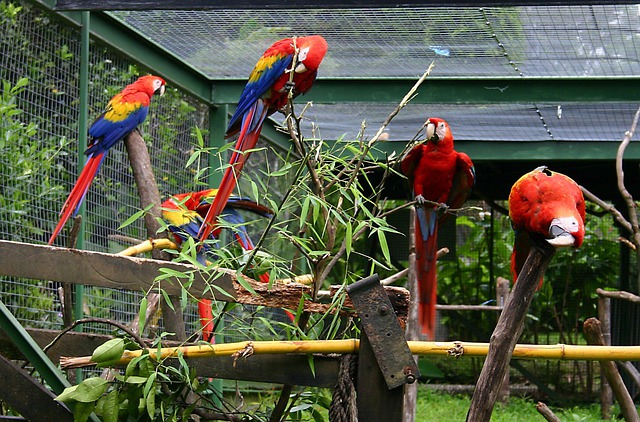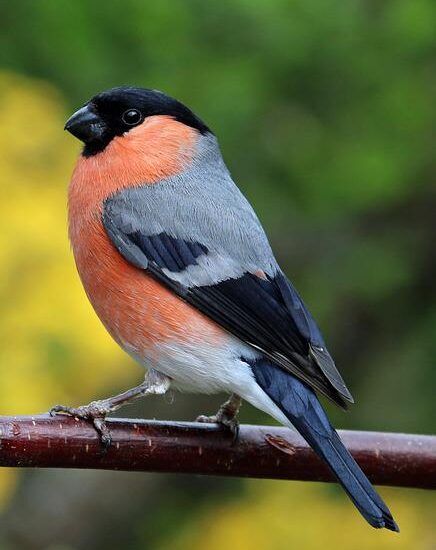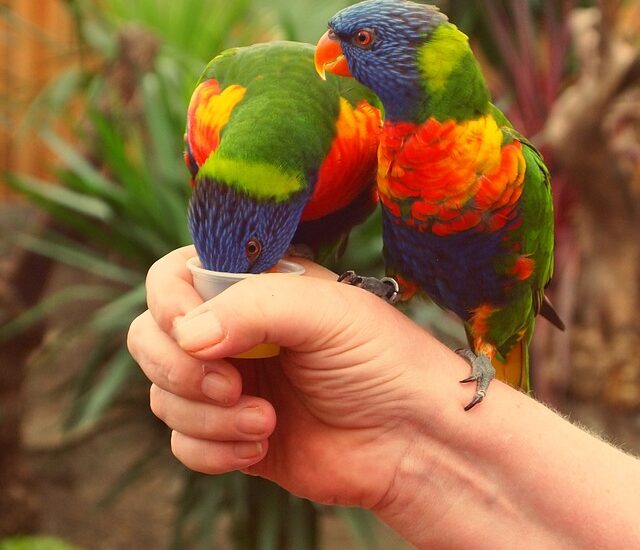Why Does My Bird Bite Me? Reasons And Solutions
It will prove quite hard to find a bird owner, whose feathery friend has never bitten him. Your bird can be fairly happy and content, interacting with other birds and people really well when it suddenly bites a person, or biting might have simply become your bird’s habit leaving you baffled as to what could have caused this behavior and how can you change this irritating and dangerous habit of your pet.
- Why Is My Bird Biting Me?
- 1. Seeking Attention
- 2. Out of Fear
- 3. Out of Boredom
- 4. Lack of Trust
- 5. Lack of Sleep or Stress
- 6. Due To Sickness or An Injury
- 7. Being Territorial
- 8. Being Hormonal
- 9. Might Be Because of You!
- How To Stop Birds from Biting?
- 1. Do Not Indulge Your Bird When It Bites You
- 2. Win Over Your Bird
- 3. Solution For Bird Biting in Fear
- 4. Solution for Territorial Bird Biting
- 5. Solution for Frustrated Birds biting
- 6. Learn The Body Language of Your Bird
- 7. Know The Difference Between an Actual Bite and a Playful Nibble
- 8. Never Hit Your Bird!
In this article, we will be looking over some major reasons for birds biting and discuss how you can go about eliminating the problem. So, you may be able to develop a better relationship with your bird. Something to always remember when dealing with birds is that they are generally used to living in the wild, and biting is of nature to them. If your bird bites you, that does not mean that the bird is inherently aggressive; rather, it signifies that it is not content with the current situation and that there might be something bothering it, as a good pet owner, it is your responsibility to determine what is wrong and subsequently find ways to deal with it.

Why Is My Bird Biting Me?
The first step to stopping your bird from biting is to find out what exactly is the cause for its action, as birds don’t randomly bite but have their own reasons. In this way, you will have a better chance of success in correcting your bird’s habit.
1. Seeking Attention
Most birds, like parrots and cockatoos, are creatures of habit and they get used to the way you have been treating them and expect you to keep up the same treatment without fail. Although, a pretty impressive feature at adapting to new environments, this can cause a problem for you in the long run if you have hand-reared them from an early age as they will want you to keep indulging them even when they have grown up. Therefore, any time the bird believes that it is being offered less attention than it deserves, it is very likely that it will bite you to get the message across.
2. Out of Fear
Birds will bite when they feel vulnerable or frightened. You may have a good bond with your pet bird but if you approach it suddenly and make it feel cornered, your bird’s first reaction will be to bite you to get out of the situation. It probably did not mean to bite you but having that instinct to protect themselves will make them snap in self-defense, probably confusing you who may perceive the bite as your bird being angry when it was just scared and defending itself against the assumed threat.
3. Out of Boredom
A common mistake new bird owners make is to assume that birds do not need enrichment stuff like other pets. Generally, birds have quite high energy, and being kept in a small cage for long periods without any stuff to entertain them or keep them busy can cause your bird to become frustrated. A frustrated bird will lash out and bite; therefore, it is in your and your feathery friend’s best interest if you find it something to play with.
4. Lack of Trust
Biting anyone they consider a threat is a natural thing for birds and since most birds kept as pets encounter the same people growing up and into their adulthood, that is why they have a set of people who they consider friends while the rest are threats. It is also possible that you, or some other family member of yours, have done something to earn their distrust in the past and since birds are infamous for holding grudges your bird has not gotten over it either.

5. Lack of Sleep or Stress
Stress and lack of sleep are among the main reasons which can make your bird more likely to bite. A change in the living condition, whether that’s the moving of their cage to a new location, a new cage, or the introduction of new people or pets in the bird’s daily life, can make your bird stressed and confused. It is also possible that your new pet, like a cat or dog, is disturbing your bird’s peace, or your bird is simply unable to get the required amount of sleep in the absolute dark that is best for the birds, which is making your bird cranky and forcing it to act out.
6. Due To Sickness or An Injury
In the wild, birds -like other animals- cannot show any weakness as that would make them an easy target for predators, that is why birds among other animals are exceptionally good at masking their injuries and any other physical discomfort they are facing. An injured bird will become more aggressive, it is a form of self-defense, this can be a warning sign for bird owners if their pet bird suddenly starts displaying a hostile attitude and biting people randomly out of nowhere if someone approaches it.
7. Being Territorial
It comes as a surprise to many people that birds can get territorial, like pet dogs and cats. Being territorial is when any animal lays claim to a specific place or thing and does its best to protect it from others of its own species as well as from any kind of threat. Similarly, when your bird becomes territorial of its cage or someone like its owner, it will try its best to make sure no one touches it. This can become a problem if the bird gets so territorial that it bites anyone who gets near you or its cage, since for your bird those things are officially his belongings, and no one should mess with them.
8. Being Hormonal
Since neutering birds is a high-risk procedure, which is neither advised nor normally carried out, you may end up noticing changes in your bird while it goes through the mating season, most of which can be confusing for new owners leading to them abandoning the bird when they don’t get any answers for the bird’s weird behaviors. When hormonal birds become more territorial of their toys, cage, and even their owners at times and will bite if anyone gets close to their stuff, birds also become very vocal during mating season and their constant high-pitched screaming can get hard to bear sometimes.
9. Might Be Because of You!
Birds are quite intelligent creatures who are good at picking up their owner’s mood and reacting accordingly, as well as doing things that make their owners react positively. So, if your bird nips you and you laugh at the mischievous attitude of your bird or talk to it more animatedly as a response, it will assume that biting you was a good thing and will probably repeat the action in the future, too.

How To Stop Birds from Biting?
Now that you know some of the reasons your bird might be biting you, you have a better prospect of eliminating the exact problem and developing a healthier relationship with your bird. While working to change your bird’s behavior, remember that consistency and patience is the key.
1. Do Not Indulge Your Bird When It Bites You
When your bird bites, do not give any sort of a reaction, whether that’s talking in loud voices or creating any form of drama rather, talk to it quietly if you must and signal to it by your body language, like frowning, that what it did was wrong. The best option would be to place your bird gently back in its cage and leave the bird alone for some time, this is best at conveying to your bird that biting won’t have any positive result. The owner during this time-out should evaluate what might be the reason for their bird biting.
2. Win Over Your Bird
If your bird has not warmed to you yet, it might be because of something that you did in the past that it is holding a grudge for, you should make sure that every time your bird is to be given its favorite treat you are the one to do it, in this way it will start to associate you with friends. The same goes for any new person you are trying to introduce into your bird’s life, do not just let the stranger approach your bird and try to pick it up, which will surely result in a bite, build a positive relationship with the bird first and then move in.
3. Solution For Bird Biting in Fear
If your bird is prone to biting when people approach it suddenly or becomes aggressive if there are several new people in its environment, you should start on making it socialize more but always at its own pace, never force it to interact with people it doesn’t feel comfortable with or take it to places it starts getting defensive in. A good first step would be to take it out of its cage and into other rooms of your house, possibly where it encounters new people, or you can also take your bird in the cage out for walks in the park to make it more used to people and new atmospheres.
4. Solution for Territorial Bird Biting
Teaching your territorial bird not to bite requires lots of patience and hard work, whether it is temporarily territorial because of being hormonal or it is a norm for your bird. If your bird is territorial of you or any other person, do not let your birdie sit on your shoulder or hands, as then it will become more possessive and is likely to bite anyone who comes near you. If your bird becomes overprotective of its cage or toys, you should move it to different locations other than its cage and switch its toys often to help avoid your bird forming a close bond with any of those things.

5. Solution for Frustrated Birds biting
Before you adopt any bird, you should do thorough research on its natural habitat and the things it requires to be happy in captivity, you should include enrichment toys and structures like a perch, hiding place, beddings, and birth bath in its enclosure to make sure that it does not becomes frustrated with pent up energy which it uses in biting people. Keep an eye out on how well your bird is adjusting to its environment and subsequently make changes so that your bird may habituate itself to its cage sooner and more easily.
6. Learn The Body Language of Your Bird
The best strategy to not getting bitten by your bird friend would be to learn the subtle signs that it displays before going in for a bite, ranging from birds to birds these signs might be different but will always be there, it might be your bird puffing up its feather, staring at you intently, or moving its tail a certain way right before biting you. If you know these cues you can avoid getting bit, but more importantly, these signals will help you avoid doing any activity that brings these changes, which can be over-stimulation for some birds like amazons or loud noises for other birds.
7. Know The Difference Between an Actual Bite and a Playful Nibble
Mostly baby birds and sometimes even adult birds will nip you playfully as birds use their beaks for several reasons other than biting, they may be showing affection, portraying their liking of something, or simply trying to get a better hang of their surroundings. The playful bite will not be strong enough to hurt, although, you should still not show any positive reinforcement following it. An actual bird bite can be quite severe, especially for young children, as it can cause bleeding and permanent scarring.
8. Never Hit Your Bird!
What you should Never do, when trying to make your bird stop biting people, is hit your bird or raise your voice at it. Birds will not change their behavior because of it, but it will rather cause them to hold a grudge against you or become afraid of you, both of these will actually be counterproductive to your initial reason for hitting them, as it will cause your bird to be defensive around you and more prone to biting than before.



